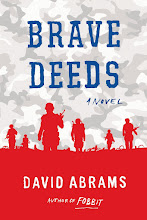My First Time is a regular feature in which writers talk about virgin experiences in their writing and publishing careers, ranging from their first rejection to the moment of holding their first published book in their hands. Today's guest is Lucy Ferriss, author of the just-released novel The Lost Daughter. Kirkus Reviews called The Lost Daughter "an unflinching study of parenthood" full of "convincing, Franzen-style realism." Ferriss has been writing fiction, poetry and literary criticism for many years. In addition to five previous novels and a collection of short fiction, she has also published a work of literary criticism and dozens of short stories, poems, articles, essays and book reviews. She has two sons and teaches at Trinity College in Connecticut. Visit her website at www.lucyferriss.com
It’s hard to reconstruct now, but a time existed when I thought everything would fall my way. An anthology had accepted three poems during my last semester in college. I had spent two years working for the most distinguished literary press in California. Moving on to grad school, I had the privilege of working with one of the best short-fiction writers in America, who had connected me with a New York agent. Finally, I had plucked a notice off the grad school bulletin board about a year-long fellowship in New Hampshire, and the next thing I knew I was the Fellow, with a year’s full support to write.
The following winter, bitter and snowless, I put aside the patchwork novel I had submitted for my degree and dove into “the real thing.” I worked all morning in my bathrobe (still do), then walked the dog through the New Hampshire village until my hands went numb from cold. My prestigious agent sent encouraging notes. She was shopping my short stories; she had great hopes.
One of those afternoons, I returned home brimming with new ideas for the book. A package sat on my front stoop. Opening it with frostbit hands, I found all my manuscripts inside, along with the rejection letters my agent had received from magazine and book editors over the preceding eight months. On the top was a brief handwritten note: Gone to Arizona to dry out. Closing the agency. Best of luck, P.
I felt like Wile E. Coyote, happily racing after the rabbit, only to discover that his legs are churning through thin air above an 80-foot drop.
Carefully I went through the contents. My stories, so carefully typed on 20% bond, seemed slight, amateurish. The novella I had composed in a fever before leaving for New Hampshire read like, well, a fever dream. The letters were mostly kind but dismissive—“Thanks for the opportunity,” “A voice with great potential,” “Sorry we have to pass.” Later, I would attend a Halloween party as a rejected manuscript, with such notes pasted all over my clothing and a post-office stamp of “Return to Sender” tattooing my face. But that winter, I was a rejection virgin. I had assumed that an agent was like a parent: they shielded you from the worst, and they never gave up.
I drank a couple of glasses of wine, did several tours of the little Fellowship house, and returned to the disaster that had landed on my porch. I plucked a rejection letter from the pile, one that seemed more sincere than the rest and invited my agent to keep in touch. In the dying January light, I rolled a sheet into the typewriter and began: Dear Ms. C--- . . . .
Two weeks later, I met Ms. C as she packed up the New York office where she had been downsized out of editing fiction. She gave me the name of another agent. That agent helped me dial back from the “real thing” project to the earlier work, which with two more years’ worth of rewriting became my first novel, Philip's Girl. There have been plenty of ups and downs since then. But when I think of the moment I joined the world of writers, I remember that package on the stoop; I remember exiting my comfort zone to write directly to that editor. Nothing was going to float my way, I realized then, except—on very lucky days—the words themselves. I was going to have to learn how to run through thin air.
Photo by John Marinelli Photography
My First Rejections
It’s hard to reconstruct now, but a time existed when I thought everything would fall my way. An anthology had accepted three poems during my last semester in college. I had spent two years working for the most distinguished literary press in California. Moving on to grad school, I had the privilege of working with one of the best short-fiction writers in America, who had connected me with a New York agent. Finally, I had plucked a notice off the grad school bulletin board about a year-long fellowship in New Hampshire, and the next thing I knew I was the Fellow, with a year’s full support to write.
The following winter, bitter and snowless, I put aside the patchwork novel I had submitted for my degree and dove into “the real thing.” I worked all morning in my bathrobe (still do), then walked the dog through the New Hampshire village until my hands went numb from cold. My prestigious agent sent encouraging notes. She was shopping my short stories; she had great hopes.
One of those afternoons, I returned home brimming with new ideas for the book. A package sat on my front stoop. Opening it with frostbit hands, I found all my manuscripts inside, along with the rejection letters my agent had received from magazine and book editors over the preceding eight months. On the top was a brief handwritten note: Gone to Arizona to dry out. Closing the agency. Best of luck, P.
I felt like Wile E. Coyote, happily racing after the rabbit, only to discover that his legs are churning through thin air above an 80-foot drop.
Carefully I went through the contents. My stories, so carefully typed on 20% bond, seemed slight, amateurish. The novella I had composed in a fever before leaving for New Hampshire read like, well, a fever dream. The letters were mostly kind but dismissive—“Thanks for the opportunity,” “A voice with great potential,” “Sorry we have to pass.” Later, I would attend a Halloween party as a rejected manuscript, with such notes pasted all over my clothing and a post-office stamp of “Return to Sender” tattooing my face. But that winter, I was a rejection virgin. I had assumed that an agent was like a parent: they shielded you from the worst, and they never gave up.
I drank a couple of glasses of wine, did several tours of the little Fellowship house, and returned to the disaster that had landed on my porch. I plucked a rejection letter from the pile, one that seemed more sincere than the rest and invited my agent to keep in touch. In the dying January light, I rolled a sheet into the typewriter and began: Dear Ms. C--- . . . .
Two weeks later, I met Ms. C as she packed up the New York office where she had been downsized out of editing fiction. She gave me the name of another agent. That agent helped me dial back from the “real thing” project to the earlier work, which with two more years’ worth of rewriting became my first novel, Philip's Girl. There have been plenty of ups and downs since then. But when I think of the moment I joined the world of writers, I remember that package on the stoop; I remember exiting my comfort zone to write directly to that editor. Nothing was going to float my way, I realized then, except—on very lucky days—the words themselves. I was going to have to learn how to run through thin air.
Photo by John Marinelli Photography














No comments:
Post a Comment